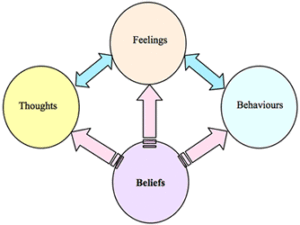Finally, brothers, whatever is true, whatever is honorable, whatever is just, whatever is pure, whatever is lovely, whatever is commendable, if there is any excellence, if there is anything worthy of praise, think about these things. What you have learned and received and heard and seen in me—practice these things, and the God of peace will be with you.” (ESV, Philippians 4:8–9)
It was during the 1974-1975 school year, which happened to be my senior year at Lincoln Christian College. On two different occasions, I had the opportunity to travel with Tom Ewald, one of my beloved professors, to attend lectureships in psychology and counseling. On this occasion, we made the short trip to Illinois State University to hear Dr. Albert Ellis. He is the founder of Rational Emotive Behavior Therapy (REBT).
Though a beautiful sunny day, the winds were coming from the north. This meant, in northern Illinois, that it was cool. I was still surprised to see the lecturer come on stage in faded dress slacks and a flannel shirt. Additionally, he sat for most of the lecture on a wooden stool, nibbling from time to time to appease his diabetes. But what he shared impressed me significantly.
During our recent move I found a note card from that adventure. The words of Dr. Ellis reminded me that I have the ability to reflect not only on what I have done or thought in the past, but also on what I am doing and thinking in the present.
“Humans, unlike all the other animals, are not only able to think about their feelings, their actions, and the results they get from doing and not doing certain things, but they also are able to think about their thinking and even think about thinking about their thinking.”
The Commands… “You all think… you all practice”
Most of us have heard someone say, “If you don’t have anything good to say, don’t say anything.” The same applies to the thinking we do before we open our mouths to speak. As I reflect on my thoughts from days past (think about my thinking), I must admit that all too often I am not contemplating the true, honorable, just, pure, lovely, commendable, things of excellence, or even things worthy of praise. This is hard to admit since Paul uses the 2nd person, plural, imperative. It’s a command: “[you all] think about these things.”
He doesn’t stop with just our thinking. We are given the example of Christ – as portrayed in the beautiful hymn of Philippians 2:1-11 – to be humble and servant minded. He also sets himself up as an example: “Brothers, join in imitating me, and keep your eyes on those who walk according to the example you have in us” (3:17). Once again, it is not a matter of choice; [you all] “practice these things” is a command (2nd person, plural, imperative).
In the conclusion of his lecture, Dr. Ellis reminded us that we are not fractured beings by design. Our thinking, emotions, behavior, and beliefs and impact each other. His words, “Not only can you think your way into behaving properly (which might include guilt), but you can also behave in such a way until it becomes a part of your thinking/beliefs.”
So let me ask you, “What are you thinking about… and why?” The prescription (Rx) – Philippians 4:8-9.

